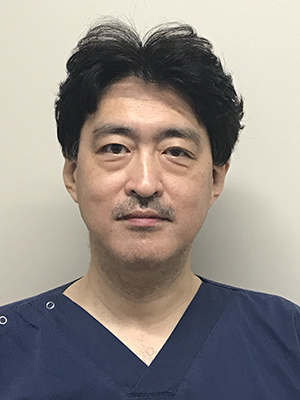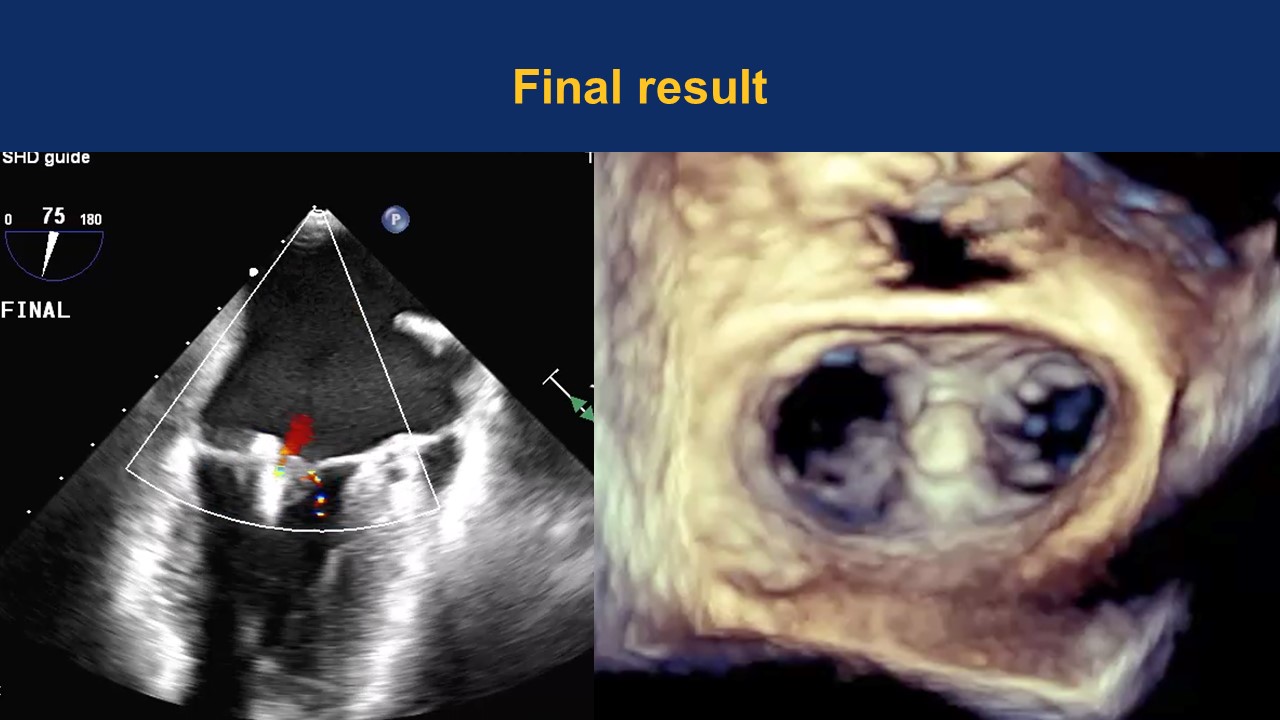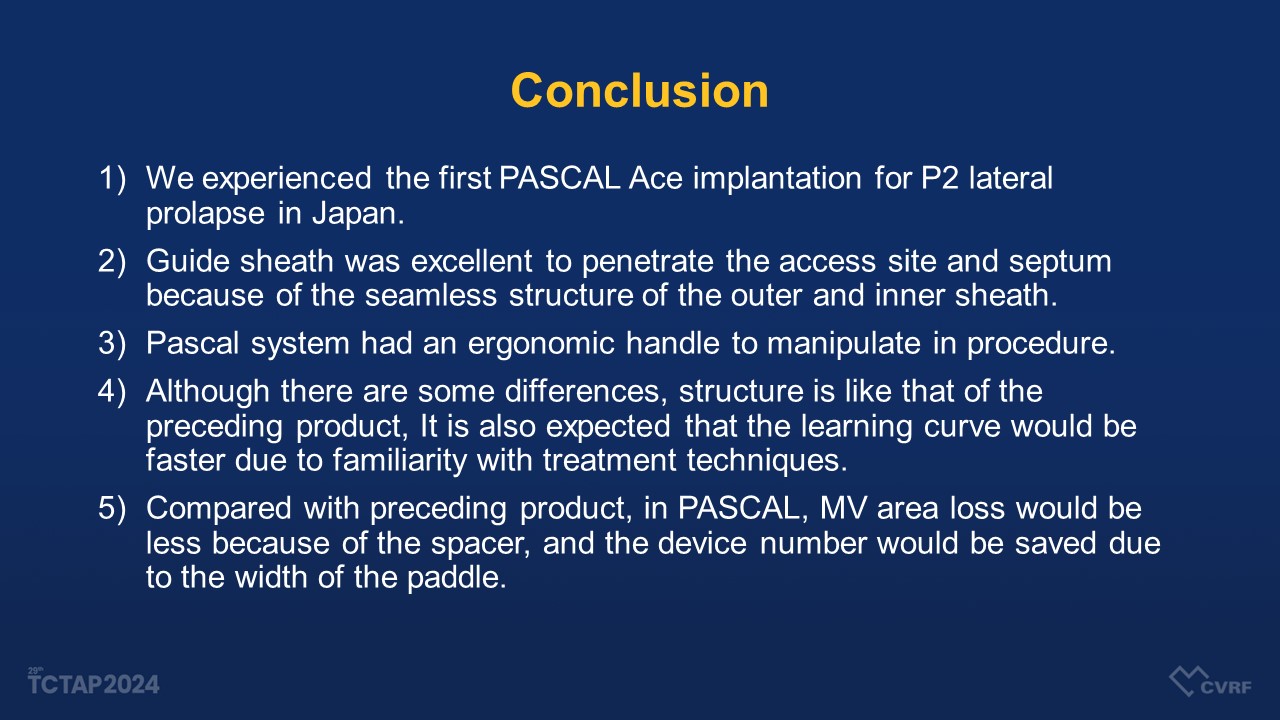News | TCTAP 2024
New Launched M-TEER Device for Degenerative Mitral Regurgitation: PASCAL Experiences in Japan
Evolution of Mitral and Tricuspid Interventions

Shinichi Shirai
Kokura Memorial Hospital, Japan
Shinichi Shirai, MD (Kokura Memorial Hospital, Japan) highlighted the advancements and clinical experiences with the PASCAL device for treating degenerative mitral regurgitation (MR) in Japan.
Shirai detailed the procedure using a case study of a 79-year-old woman with severe MR due to P2 prolapse. Despite her complex medical history, the team opted for the M-TEER procedure using the PASCAL system (Figure 1). Pre-procedure echocardiography showed significant regurgitation with an effective regurgitant orifice (ERO) of 0.76 cm².

Figure 1. Final results of M-TEER procedure using the PASCAL system
Advantages of the PASCAL system: Ergonomic Design and Ease of Use
The ergonomic handle and ease of manipulation were highlighted, making the procedure smoother and potentially reducing the learning curve. Shirai emphasized the system's guide sheath, which easily penetrated the septal portion, facilitating straightforward atrial navigation.
PASCAL Clips: Tailored Solutions for Varied Anatomical Needs
The PASCAL system offers two types of clips: PASCAL Ace and PASCAL, catering to different anatomical needs. The ergonomic design and streamlined structure make it user-friendly and effective in reducing left atrial pressure post-procedure, with no residual mitral stenosis and improved pulmonary vein flow.
Early Clinical Experiences and Future Prospects of the PASCAL System in JAPAN
Shirai concluded the lecture by underscoring the numerous benefits of the PASCAL system, based on their initial experiences in Japan (Figure 2). Due to its seamless structure, the guide sheath was particularly effective in accessing and penetrating the septum. The PASCAL system's ergonomic handle allowed for precise manipulation during the procedure, which is crucial for successful outcomes. Although structural differences exist compared to preceding products, familiarity with treatment techniques may contribute to a faster learning curve for practitioners. Compared to the previous devices, the PASCAL system showed less mitral valve area loss due to its spacer, and the width of the paddle could potentially reduce the number of devices needed per procedure. Overall, the PASCAL system represents a significant advancement in the treatment of degenerative MR, offering enhanced patient outcomes and a promising future for mitral valve interventions in Japan and beyond.

Figure 2. Conclusion from the Japanese experiences of using the PASCAL device
Hot Topics
Evolution of Mitral and Tricuspid Interventions
Saturday, April 27, 10:40 AM ~ 11:52 AM
Valve & Endovascular Theater, Level 2
Edited by

Junghoon Lee, MD
Catholic university of Korea, Eunpyeong St. Mary's hospital, Korea (Republic of)

Shinichi Shirai
Kokura Memorial Hospital, Japan
Shinichi Shirai, MD (Kokura Memorial Hospital, Japan) highlighted the advancements and clinical experiences with the PASCAL device for treating degenerative mitral regurgitation (MR) in Japan.
Shirai detailed the procedure using a case study of a 79-year-old woman with severe MR due to P2 prolapse. Despite her complex medical history, the team opted for the M-TEER procedure using the PASCAL system (Figure 1). Pre-procedure echocardiography showed significant regurgitation with an effective regurgitant orifice (ERO) of 0.76 cm².

Advantages of the PASCAL system: Ergonomic Design and Ease of Use
The ergonomic handle and ease of manipulation were highlighted, making the procedure smoother and potentially reducing the learning curve. Shirai emphasized the system's guide sheath, which easily penetrated the septal portion, facilitating straightforward atrial navigation.
PASCAL Clips: Tailored Solutions for Varied Anatomical Needs
The PASCAL system offers two types of clips: PASCAL Ace and PASCAL, catering to different anatomical needs. The ergonomic design and streamlined structure make it user-friendly and effective in reducing left atrial pressure post-procedure, with no residual mitral stenosis and improved pulmonary vein flow.
Early Clinical Experiences and Future Prospects of the PASCAL System in JAPAN
Shirai concluded the lecture by underscoring the numerous benefits of the PASCAL system, based on their initial experiences in Japan (Figure 2). Due to its seamless structure, the guide sheath was particularly effective in accessing and penetrating the septum. The PASCAL system's ergonomic handle allowed for precise manipulation during the procedure, which is crucial for successful outcomes. Although structural differences exist compared to preceding products, familiarity with treatment techniques may contribute to a faster learning curve for practitioners. Compared to the previous devices, the PASCAL system showed less mitral valve area loss due to its spacer, and the width of the paddle could potentially reduce the number of devices needed per procedure. Overall, the PASCAL system represents a significant advancement in the treatment of degenerative MR, offering enhanced patient outcomes and a promising future for mitral valve interventions in Japan and beyond.

Hot Topics
Evolution of Mitral and Tricuspid Interventions
Saturday, April 27, 10:40 AM ~ 11:52 AM
Valve & Endovascular Theater, Level 2
Edited by

Junghoon Lee, MD
Catholic university of Korea, Eunpyeong St. Mary's hospital, Korea (Republic of)

Leave a comment